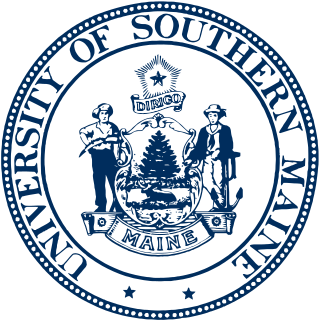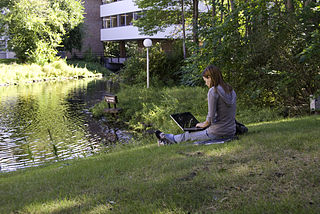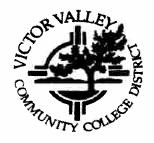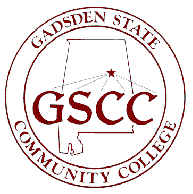
Monroe Community College(MCC) is a public community college in Monroe County, New York. It is part of the State University of New York. The college has two campuses; the main campus in the town of Brighton, and the Downtown Campus in the City of Rochester. The college also has off-site learning at the Applied Technologies Center, Monroe County Public Safety Training Facility, and offers online classes. As of 2023, MCC has enrolled more than a half a million students.

The University of Southern Maine (USM) is a public university with campuses in Gorham and Portland, Maine. It is the southernmost university in the University of Maine System. It was founded as two separate state universities, Gorham Normal School and Portland University. The two universities, later known as Gorham State College and the University of Maine at Portland, were combined in 1970 to help streamline the public university system in Maine and eventually expanded by adding the Lewiston campus in 1988.

Manchester Community College (MCC) is a public community college in Manchester, Connecticut. Founded in 1963, it is the third-oldest of the twelve community colleges governed by the Connecticut State Colleges & Universities system (CSCU) and has graduated more than 23,000 students since the first class in 1965.
Southern West Virginia Community and Technical College (Southern) is a public community college with its main campus in Mount Gay, West Virginia. It is part of the West Virginia Community and Technical College System.

Colorado State University Pueblo is a public university in Pueblo, Colorado, United States. It is part of the Colorado State University System and a Hispanic-Serving Institution (HSI).

Muskegon Community College (MCC) is a public community college in Muskegon, Michigan. The college offers 49 associate degree programs and 33 certificate programs. The college's main campus is located on a 111-acre campus in Muskegon, with extension centers in Ottawa and Newaygo counties.

Jefferson Community and Technical College (JCTC) is a public community college in Louisville, Kentucky. It is part of the Kentucky Community and Technical College System and the largest college in that system. JCTC was formed on July 1, 2005, by the consolidation of Jefferson Community College and Jefferson Technical College. Jefferson Community College was originally chartered in 1968 and Jefferson Technical College was chartered in 1953. JCTC is accredited by the Southern Association of Colleges and Schools (SACS).

Victor Valley College is a public community college in Victorville, California. It is part of the California Community College System. The Victor Valley Community College district includes Victorville, Hesperia, Apple Valley, Phelan and Adelanto.

East Mississippi Community College (EMCC), formerly East Mississippi Junior College, is a public community college in Scooba, Mississippi. EMCC serves and is supported by Clay, Kemper, Lauderdale, Lowndes, Noxubee and Oktibbeha counties in east central Mississippi. The college has two principal campuses in Scooba and Mayhew, Mississippi and offers courses at five other locations. One of fifteen community colleges in Mississippi, EMCC is accredited by the Southern Association of Colleges and Schools Commission on Colleges (SACSCOC) to award the Associate of Applied Science degree and the Associate of Arts degree.
Metropolitan Community College is a public community college in Omaha, Nebraska. It has multiple campuses throughout the Omaha–Council Bluffs metropolitan area.

Metropolitan Community College is a public community college system in the U.S. state of Missouri. The system consists of four physical campuses in Kansas City, Independence, and Lee's Summit, as well as the MCC-Online campus. The campuses had a total enrollment of 13,376 for the fall semester of 2023. The college's athletic teams are known as the Wolves. It is not affiliated with Metropolitan Community College in Omaha, Nebraska.

Madisonville Community College (MCC) is a public community college in Madisonville, Kentucky. It is one of 16 two-year, open-admissions colleges of the Kentucky Community and Technical College System (KCTCS). MCC was originally established as a member of the University of Kentucky's Community College System in 1968. In 2001, the college consolidated with Madisonville Technical College, itself originally established in 1937 as the Madisonville Area Trade School. MCC offers associate degree programs, as well as technical diplomas and certificates, with the overall purpose of making postsecondary educational opportunities available to Kentucky's citizens and workforce. MCC is accredited by the Southern Association of Colleges and Schools (SACS). In 2011, it was ranked among the nation's top 10% of community colleges by the Aspen Institute.

Lorain County Community College (LCCC) is a public community college in the city of Elyria in Lorain County, Ohio, with learning centers in Wellington, North Ridgeville, and Lorain. In addition to associate degrees and certificates, students can earn bachelor's and master's degrees on campus through the college's partnerships with universities.
Central Maine Community College is a public community college in Auburn, Maine. It is part of the Maine Community College System.

Southern Maine Community College is a public community college with campuses in South Portland and Brunswick, Maine. It is part of the Maine Community College System.

McHenry County College (MCC) is a public community college in McHenry County, Illinois. The college serves residents residing in Community College District 528, which covers most of McHenry County and portions of surrounding counties. MCC offers associate degrees programs and certificates.
In the United States, community colleges are primarily two-year public institutions of tertiary education. Community colleges offer undergraduate education in the form of an associate degree. In addition, community colleges also offer remedial education, GEDs, high school diplomas, technical diplomas and tech certificates, and occasionally, at some colleges, a limited number of 4-year bachelor's degrees. After graduating from a community college, some students transfer to a four-year college or university to continue their studies leading to a bachelor's degree. Community college is tuition-free for selected students in 47 states, often under the name College Promise. Most community college instructors have advanced degrees but serve as part-time low wage employees.

Gadsden State Community College is a public community college with campuses in Gadsden, Centre and Anniston, Alabama. The college was founded as a merger between Alabama Technical College (1925), Gadsden State Technical Institute (1960) and Gadsden State Junior College (1965). Gadsden State is accredited by the Southern Association of Colleges and Schools Commission on Colleges. It offers associate degree, certificate and non-credit courses thorough more than 70 programs. The college's campuses serve Calhoun, Cherokee, Cleburne, Etowah and St. Clair counties, as well as neighboring counties in Georgia.
Barbara W. Woodlee is an American college administrator. She was president of Kennebec Valley Community College in Fairfield, Maine, from 1984 to 2012, and since 2013 has served as chief academic officer of the Maine Community College System. She was the first woman president in both the state technical college and community college systems. She was inducted into the Maine Women's Hall of Fame in 2015.
Biddeford Regional Center of Technology (BRCOT) is a vocational school located in Biddeford, Maine, United States. It is a secondary vocational school located on the Biddeford High School campus for students enrolled at Biddeford High School, Kennebunk High School, Old Orchard Beach High School and Thornton Academy.














